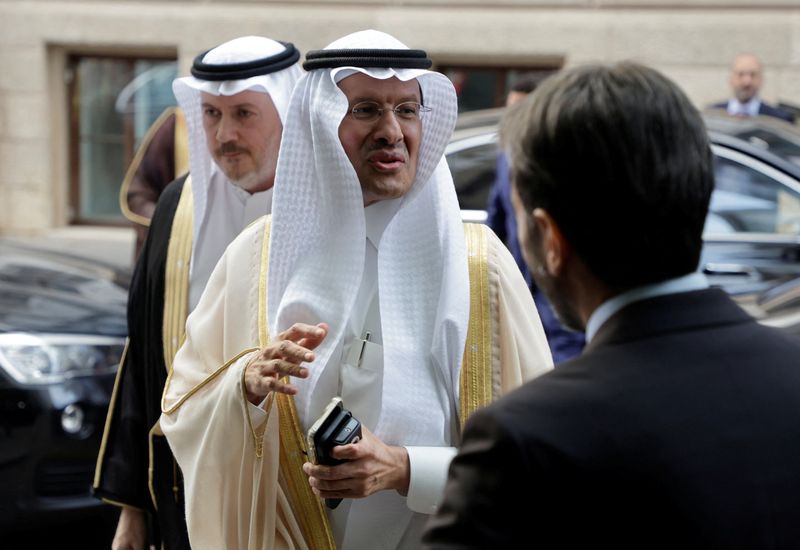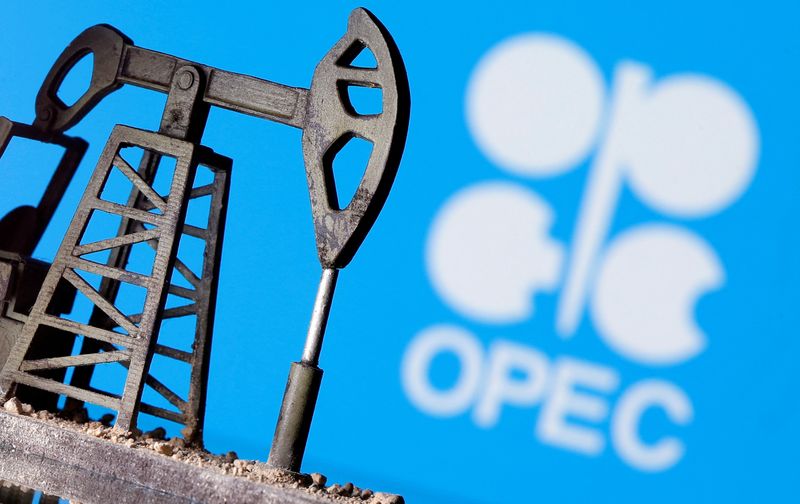By Maha El Dahan, Alex Lawler and Ahmad Ghaddar
VIENNA (Reuters) -Saudi Arabia will make a deep cut to its output in July on top of a broader OPEC+ deal to limit supply into 2024 as the group seeks to boost flagging oil prices.
Saudi's energy ministry said the country's output would drop to 9 million barrels per day (bpd) in July from around 10 million bpd in May, the biggest reduction in years.
"This is a Saudi lollipop," Saudi Energy Minister Prince Abdulaziz told a news conference. "We wanted to ice the cake. We always want to add suspense. We don't want people to try to predict what we do... This market needs stabilisation".
OPEC+, which groups the Organization of the Petroleum Exporting Countries and allies led by Russia, pumps around 40% of the world's crude, meaning its policy decisions can have a major impact on oil prices.
A surprise decision to cut supply in April briefly sent international benchmark Brent crude around $9 higher, but prices have since retreated under pressure from concerns about the weakness of the global economy and its impact on demand.
On Friday, Brent ended trade for the week at $76.
Saudi Arabia is the only member of OPEC+ with sufficient spare capacity and storage to be able to easily reduce and increase output.
It was able to respond rapidly to excess supply that weakened the market in the early stages of the pandemic in 2020 when the group of producers implemented record output cuts.
EXTENSION TO END OF 2024
OPEC+ has in place cuts of 3.66 million bpd, amounting to 3.6% of global demand, including 2 million bpd agreed last year and voluntary cuts of 1.66 million bpd agreed in April.
Those cuts were valid until the end of 2023 and on Sunday OPEC+, in a broader deal on output policy agreed after seven hours of talks, said it would extend them until the end of 2024.
Since Russia's invasion of Ukraine began in February last year, Western nations have accused OPEC of manipulating oil prices and undermining the global economy through high energy costs. The West has also accused OPEC of siding with Russia.
In response, OPEC insiders have said the West's money-printing over the last decade has driven inflation and forced oil-producing nations to act to maintain the value of their main export.
Analysts said Sunday's OPEC+ decision sent a clear signal the group was willing to support prices and attempt to thwart speculators.
"It is a clear signal to the market that OPEC+ is willing to put and defend a price floor," Amrita Sen, co-founder of Energy Aspects think-tank, said.
Veteran OPEC watcher and founder of Black Gold Investors Gary Ross said: "The Saudis have made good on their threats to speculators and they clearly want higher oil prices."
As the market stayed closed on Sunday, UBS analyst Giovanni Staunovo predicted a strong start when it reopens on Monday.
In addition to extending the existing OPEC+ cuts of 3.66 million bpd, the group also agreed on Sunday to reduce overall production targets from January 2024 by a further 1.4 million bpd versus current targets to a combined of 40.46 million bpd.

However, many of these reductions will not be real as the group lowered the targets for Russia, Nigeria and Angola to bring them into line with actual current production levels.
By contrast, the United Arab Emirates was allowed to raise output targets by around 0.2 million bpd to 3.22 million bpd.
